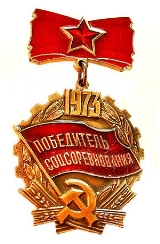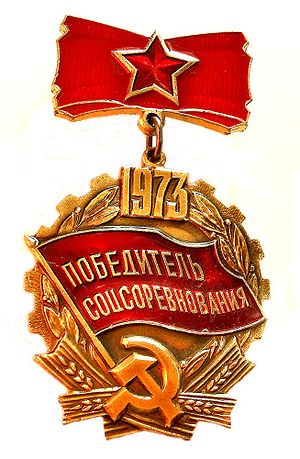
Socialist competition
Encyclopedia

Soviet Union
The Soviet Union , officially the Union of Soviet Socialist Republics , was a constitutionally socialist state that existed in Eurasia between 1922 and 1991....
and in other Eastern bloc
Eastern bloc
The term Eastern Bloc or Communist Bloc refers to the former communist states of Eastern and Central Europe, generally the Soviet Union and the countries of the Warsaw Pact...
states.
Competition vs. emulation
The first variant is a literal translation of the Russian term, commonly used by Western authors. The second form is an official Soviet translation of the term, intended to put distance from the "capitalist competitionCompetition
Competition is a contest between individuals, groups, animals, etc. for territory, a niche, or a location of resources. It arises whenever two and only two strive for a goal which cannot be shared. Competition occurs naturally between living organisms which co-exist in the same environment. For...
", which in its turn was translated as "капиталистическая конкуренция", "kapitalisticheskaya konkurenciya".
There was a significant amount of propaganda
Propaganda
Propaganda is a form of communication that is aimed at influencing the attitude of a community toward some cause or position so as to benefit oneself or one's group....
along the lines that "capitalist
Capitalism
Capitalism is an economic system that became dominant in the Western world following the demise of feudalism. There is no consensus on the precise definition nor on how the term should be used as a historical category...
competition" favors only the winning capitalist, while "socialist emulation" benefits all.
Organization
Socialist emulation was voluntary everywhere where people worked or served: in industry, in agriculture, in offices, institutions, schools, hospitals, army, etc. With the natural exception of armed force, committees of Soviet trade unions were in charge of managing the socialist emulation.An important component of socialist emulation was "socialist self-obligations" (социалистические обязательства). While the production plan was the major benchmark, employees and work collectives were supposed to put forth "socialist self-obligations" and even "enhanced socialist self-obligations" (повышенные соцобязательства) beyond the plan.
Deadlines for tallying up the results of a socialist emulation were usually set at major Socialist and Communist holidays or notable dates, like the birthday of Vladimir Lenin
Vladimir Lenin
Vladimir Ilyich Lenin was a Russian Marxist revolutionary and communist politician who led the October Revolution of 1917. As leader of the Bolsheviks, he headed the Soviet state during its initial years , as it fought to establish control of Russia in the Russian Civil War and worked to create a...
or the anniversary of the October Revolution
October Revolution
The October Revolution , also known as the Great October Socialist Revolution , Red October, the October Uprising or the Bolshevik Revolution, was a political revolution and a part of the Russian Revolution of 1917...
.
Winners were awarded both materially and morally. Material awards were money, goods or perks specific to Socialist system, such as tickets to resorts, authorizations for a trip abroad, right to obtain a dwelling or a car outside the main queue
Queue
A queue is a particular kind of collection in which the entities in the collection are kept in order and the principal operations on the collection are the addition of entities to the rear terminal position and removal of entities from the front terminal position. This makes the queue a...
, etc. Moral awards were honorary diploma, honorary badges, putting winners' portraits on the "Board of Honor" (Доска Почета); work collectives were awarded with the "Transferrable Red Banner of the Socialist Emulation Winner" (Переходящее знамя победителя в социалистическом соревновании).
History
Vladimir Lenin was the originator and the promoter of the idea of socialist emulation as a means for organising "the majority of working people into a field of labour in which they can display their abilities, develop the capacities, and reveal those talents". His milestone article was "How to organize the emulation?" ("Как организовать соревнование?"), in which among the important goal of the emulation was discovery of persons with organizational and management skills, to replace tsarist-era specialists. Also, he was the first to set "socialist emulation" against "capitalist competition".Later, Joseph Stalin
Joseph Stalin
Joseph Vissarionovich Stalin was the Premier of the Soviet Union from 6 May 1941 to 5 March 1953. He was among the Bolshevik revolutionaries who brought about the October Revolution and had held the position of first General Secretary of the Communist Party of the Soviet Union's Central Committee...
wrote in his streamlined style:
- Principles of (capitalist) competition: defeat and death of ones and victory and dominance of the others.
- Principles of socialist emulation: friendly assistance to lagging ones by the leading ones in order to achieve a common rise. ...etc.
While criteria of socialist emulation were easy to set, understand and quantify in production areas, it was not so in non-production areas: medicine, education, work of clerks, etc., where significant formalism took place and among the criteria a significant weight was attributed to "social activism", not related to the work done.
See also
- Counterplan (Soviet planning)Counterplan (Soviet planning)In the economy of the Soviet Union and other communist states of the Soviet Bloc, the counterplan was a plan put forth by workers of an enterprise to exceed the expectations of the state plan allocated for the enterprise/unit. It was an important part of the socialist competition...
- StakhanoviteStakhanoviteIn Soviet history and iconography, a Stakhanovite follows the example of Aleksei Grigorievich Stakhanov, employing hard work or Taylorist efficiencies to over-achieve on the job.- History :...
- UdarnikUdarnikUdarnik is a Russian, Bosnian, Croatian and Serbian term for a superproductive worker in the Soviet Union and ex-Yugoslavia. The term is derived from the expression "udarny trud" for "superproductive, enthusiastic labour", which is often translated as strike labour , and udarnik as strike worker,...
- SubbotnikSubbotnikFor the Jewish-identifying community, see Subbotniks.Subbotnik and voskresnik were days of volunteer work following the Bolshevik seizure of power. The tradition is continued in modern Russia and some other former Soviet Republics...
- GamificationGamificationGamification is the use of game design techniques and mechanics to solve problems and engage audiences. Typically gamification applies to non-game applications and processes , in order to encourage people to adopt them...

